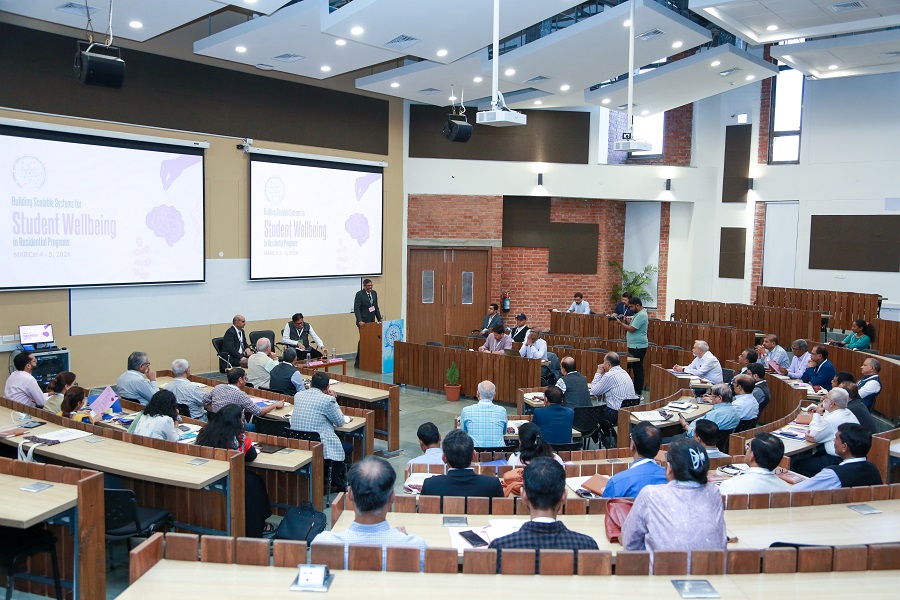STORY CREDITS
Writer: Saumya Mishra
Photo: Mayur Bhatiya
The Indian Institute of Technology, Gandhinagar (IITGN) hosted a two-day workshop on students’ mental well-being titled ‘Building Scalable Systems for Student Wellbeing in Residential Programs’ in its campus on March 4-5, 2024. The workshop aimed to create robust systems in place in higher education institutes to ensure early identification of mental health issues, effective strategies, and best practices to foster supportive environments prioritising students’ mental health and emotional well-being.
Leading experts, mental health professionals, psychologists, psychotherapists, neurologists, and academicians participated in the workshop which served as a platform for a dynamic exchange of ideas and experiences.
Dr Amit Sen, Director of Children First India, presented a keynote address on ‘Understanding the Landscape of Student Well-being’. Sharing some pertinent insights, Dr Sen mentioned that 24 youth die by suicide every day, and 75% of all mental disorders emerge before the age of 25.
“It becomes important to foster emotional literacy among children and to ensure their agency and participation in mental health initiatives. All stakeholders should actively create emotionally-safe spaces for children and scaffold them during transitions, which aids in building resilience,” he said.
Dr Rajinder K Dhamija, Director Institute of Human Behaviour and Allied Sciences (IHBAS), presented a keynote address on ‘Promoting Resilience and Wellbeing Practices’. Highlighting some of the key responsibilities of facilitators and said, “We must train our faculty to observe for signs of stress and report problems, provide peer support groups for faculty and students, and have clinical psychologists on campus.”
During a panel discussion, elaborating on the various kinds of pressures that students face nowadays, Prof Rajat Moona, Director, IITGN, said, “One of the reasons for anxiety and depression amongst students is an unhealthy sense of competition, when they feel that their peers are doing better than them. It is further intensified because of a lack of proper communication channels among families, peers, students, and teachers. Moreover, social media which was ironically created as a channel for communication further alleviates it.”
IITGN, a “students-first” institution, has consistently championed holistic development, placing mental well-being at the heart of its student support system. Sharing some of the best practices followed by IIT Gandhinagar, Prof Moona stated that early identification of mental health issues among students is crucial and these are generally deep-rooted problems. IITGN has systems in place where students can voice their concerns at the end of each semester.

Arvinder J Singh, Director, Ashoka Centre for Wellbeing, presented a keynote address on ‘Building a culture of wellbeing’.
Furthermore, in his keynote address, Dr Jitendra Nagpal, psychiatrist, VIMHANS and Moolchand Hospital, spoke about ‘Developing Scalable Support Systems’ and understanding the challenges and strategies to implement effective screening, intervention, and referral systems for early identification and support.
Soumitra Pathare, Director, Center for Mental Health Law and Policy, in his talk on ‘Leadership and Policy Change’, spoke about the ways to build institutional structures and allocating resources to sustain well-being initiatives.
During the course of the two-day workshop, mental health experts and academicians brainstormed and charted out several action plans to be implemented at various institutions to strengthen student wellbeing. These included providing counselling for parents, training and sensitisation of non-teaching staff at the institutes, creating ‘wellness buddies’ for students in hostels, creating targeted programmes for students, faculty, and mentors. Further, suggestions were also made for annual meetings of deans of higher educational institutes to share best practices related to reinforcing positive mental health in students, and creating a wellness calendar across institutes to organise wellness-related events.
Some of the other esteemed participants included directors and deans from various IITs, NITs, IISERs, and IIITs.

